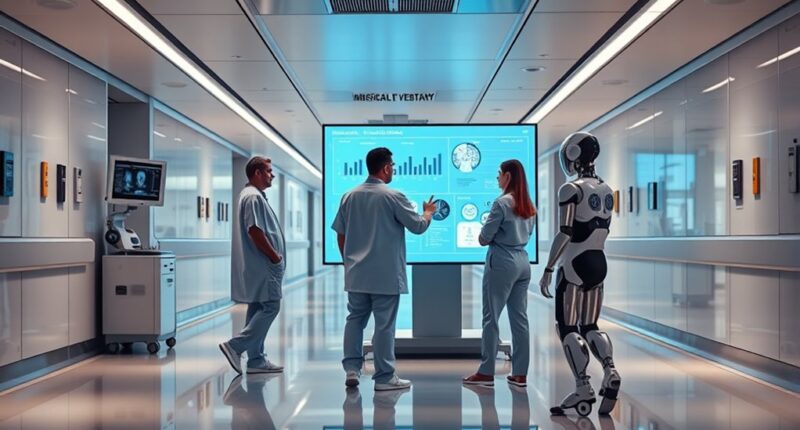Georgia hospitals are increasingly using AI assistants to support medical teams, boosting efficiency and patient safety. These AI tools help with documentation, automate routine tasks, and provide early alerts for patient deterioration. Hospitals like Northeast Georgia and Emory Healthcare are integrating speech-to-text systems and virtual nursing to lighten clinicians’ workload. If you want to discover how these innovations are transforming healthcare delivery and improving outcomes, there’s more to explore below.
Key Takeaways
- Multiple Georgia hospitals, including Northeast Georgia Health System, have integrated AI assistants like Dragon DAX Copilot into their electronic health records.
- AI-powered virtual nursing, utilizing sensors and voice prompts, helps monitor patient safety and reduce fall incidents.
- Automated communication systems improve pre-surgical instructions and follow-up, enhancing operational efficiency.
- AI tools assist clinicians with real-time documentation, reducing cognitive load and allowing more focus on patient care.
- Partnerships with tech companies like Microsoft support AI deployment, transforming hospital workflows and staff support systems.

Have you ever wondered how Georgia hospitals are transforming patient care with artificial intelligence? It’s happening right now, thanks to a thorough statewide framework emphasizing ethical and responsible AI use. Georgia’s 2025 AI Roadmap prioritizes creating clear guidelines, establishing an AI Advisory Council, and maintaining statewide AI inventories to guarantee proper governance. These efforts help hospitals adopt AI safely and effectively. They’re also developing sector-specific protocols and risk management strategies to guide hospitals in integrating AI tools without compromising patient safety. For healthcare professionals, Georgia is rolling out AI literacy and workforce training programs, making sure staff are equipped to work alongside these new technologies. The goal is a smooth shift that enhances care while minimizing disruptions.
In addition, the Georgia Innovation Lab pilots innovative AI projects focused on security and ethics. These initiatives test and refine AI applications in real healthcare settings before broader deployment. The results are promising. For example, the AI adoption rate in Georgia is climbing steadily, with 79% of healthcare organizations now actively using AI technologies. These include ambient clinical documentation systems in some Atlanta hospitals, which automate note-taking and reduce the documentation burden for clinicians. AI is also making a notable impact on diagnostics, with applications like robot-assisted surgeries and automated diagnostic tools, providing faster and more accurate results. The integration of automation technologies in these processes ensures that hospitals can adapt to evolving healthcare demands.
One standout example is Northeast Georgia Health System (NGHS), which integrated Dragon DAX Copilot into its Epic EHR system. This AI-driven tool supports clinicians by converting speech into clinical notes, markedly reducing screen time. Over 480 NGHS clinicians have been trained to use this technology, leading to less cognitive load and better work-life balance. The ambient orders feature streamlines workflows further, allowing clinicians to focus more on patient care rather than administrative tasks. NGHS’s partnership with Microsoft demonstrates how AI can transform care delivery while also alleviating staff burnout.
At Emory Healthcare, AI-powered virtual nursing is reshaping inpatient care. Using AI and telehealth, the hospital monitors patients with LIDAR sensors that detect falls up to 30 seconds before they happen, alerting staff immediately. Automated voice prompts instruct patients to stay in bed during fall risks, preventing injuries. This technology supports early deterioration detection and emergency alerts, expanding across multiple hospitals and promising wider adoption by 2026. The integration of AI into hospital workflows has shown to significantly improve patient safety and staff efficiency.
AI’s influence extends beyond inpatient care. Hospitals now use automated SMS and call systems for pre-surgical instructions and post-surgery follow-ups, reducing no-shows and improving scheduling efficiency. In diagnostics and radiology, AI tools generate clearer instructions and reduce patient confusion, leading to smoother workflows and better outcomes. Georgia hospitals are harnessing AI assistants to support medical teams, streamline operations, and deliver higher-quality patient care.
Frequently Asked Questions
How Do AI Assistants Ensure Patient Data Privacy?
AI assistants guarantee patient data privacy by using encryption during data transmission and storage, restricting access with strict policies, and anonymizing information to protect identities. You should also ensure they comply with regulations like HIPAA, sign Business Associate Agreements, and obtain patient consent before data collection. Regular staff training, security audits, and monitoring help detect breaches early, while transparent methods build trust and accountability in data handling.
What Training Is Required for Staff to Use AI Tools?
Using AI tools is like assembling a complex puzzle—you need the right pieces and knowledge. You’ll undergo specialized training, including courses on AI methods, ethics, and healthcare informatics. You’ll learn to interpret AI outputs, manage data privacy, and incorporate AI into workflows. Ongoing education, certifications, and mentorship help you stay updated. This training guarantees you confidently and ethically utilize AI, enhancing patient care and streamlining clinical tasks effectively.
Are AI Assistants Available in Multiple Languages?
Yes, AI assistants are available in multiple languages. You can use them to communicate with diverse patients in their preferred language, including popular options like Spanish, Mandarin, Russian, Portuguese, and Vietnamese. These AI tools offer real-time translation, support multilingual documentation, and improve patient satisfaction. By integrating these assistants into your healthcare system, you guarantee better understanding, reduce miscommunication, and provide more accessible care to all patients.
How Do AI Assistants Impact Patient-Doctor Communication?
AI assistants enhance your patient-doctor communication by helping you craft more empathetic, detailed messages that foster trust and understanding. They reduce your cognitive load, making it easier to respond thoughtfully, especially during busy times. AI also supports clear explanations of complex info and streamlines routine tasks, freeing up your time. When used as an aid, AI can strengthen relationships, improve engagement, and promote person-centered care.
What Is the Cost of Implementing AI Assistants in Hospitals?
The cost of implementing AI assistants in hospitals varies widely, ranging from around $20,000 for small clinics to over $500,000 for larger systems. You should consider expenses like software development, system integration, staff training, and ongoing maintenance. Hidden costs, such as data preparation and infrastructure upgrades, can add markedly to your budget. Overall, expect a considerable investment, but one that could lead to long-term savings and improved patient care.
Conclusion
As you see, Georgia hospitals are embracing AI assistants like shining stars guiding medical teams through the night. These innovations are not just gadgets—they’re lifelines that enhance care, efficiency, and hope. By integrating AI, you’re witnessing a future where technology and compassion work hand in hand, transforming challenges into opportunities. It’s a demonstration to how progress can light the path toward better health for everyone, turning hurdles into stepping stones for a brighter tomorrow.









